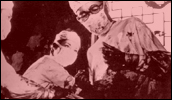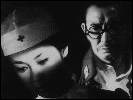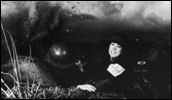Red Angel
- Year
- 1966
- Original title
- Akai Tenshi
- Japanese title
- 赤い天使
- Director
- Cast
- Running time
- 92 minutes
- Published
- 3 April 2001



by Jasper Sharp
Sent to the Manchurian frontline during the Sino-Japanese war in 1939, the angelic nurse Sakura Nishi (Ayako Wakao, who starred in a good number of films by Masumura, including his 1964 love-triangle drama Manji) plays Florence Nightingale to the barracks of wounded soldiers along with the rest of the nurses who ceaselessly tend to their patients. One evening after entering the ward she is overpowered by her patients and raped. The following day she is given a dressing down by the officious Head Nurse for breach of discipline. Whilst bed-bathing one of the soldiers who has lost both of his arms in the battle (Yusuke Kawazu) he asks her to sleep with him. After her superior advises her to submit to his requests as part of the treatment, the injured soldier Orihara commits suicide by throwing himself from a window, leaving her a note thanking her for allowing him one final glimpse of happiness.
Meanwhile the angelic nurse Nishi finds herself increasingly drawn to doctor Okabe (Shinsuke Ashida). Embittered both by the futility of the war and by his own inability as a doctor to treat the dozens of wounded fighters who are dropping dead of gangrene and cholera under the harsh conditions, and rendered impotent by his own addiction to morphine, the angelic nurse nonetheless succumbs to his invitation to spend the night by his side before delivering the ultimatum that he gives up the drugs in order to submit himself to his growing love for her. The following day the Chinese troops close in.
Made for Daiei Studios, Yasuzo Masumura's stark wartime drama, an adaptation of a novel by Yorichika Arima, is one of the handful of films made in the mid-1960s dealing with the personal experiences of those involved in the war, including the same director's previous Hoodlum Soldier (Heitai Yakuza, 1965) and Seijun Suzuki's Story of a Prostitute (Shunpuden, 1966). Both Masumura and Suzuki had been active in the final years of the war, and both used their experience to examine the conflicts and interpersonal dramas that arose on the frontline in order to question such concepts as duty and loyalty to their country. To this end both directors approach their subject using strong female protagonists whose role in the war is often forgotten, with Suzuki's film focusing on a group of prostitutes sent out to the frontline to service the soldiers, and Red Angel almost making analogous use of the nurses (although Masumura's film does feature a group of prostitutes and takes pains to point out that the nurses' duty is not the same as theirs!). In a world gone mad it is these female characters who provide the only source of stability and comfort, even morality, whilst the shell-shocked, emasculated walking wounded dream of returning home to their families.
Less reliant on cinematic device and focusing more on drawing out the depths of the individual characters from the dramatic situations that arise within the course of the film's running time, Masumura's approach ultimately makes for more compelling viewing than Suzuki's (though Story of a Prostitute is strong in its own right). Beginning with a montage of real-life stills of barbed wire, skulls, and blasted trenches all laid against nurse Nishi's doleful account of how she was sent to the frontline, from the very outset Red Angel eschews the 'death and glory' approach to paint a particularly bleak portrait of the full horrific futility of the war. Shot in dark monochrome widescreen, it dwells on images which border on the grotesque, as the ramshackle operations set in claustrophobic, makeshift operating theatres are intercut with shots of buckets full of amputated arms and legs. The Red Angel's comforting presence acts as a catalyst to draw out the conflicting emotions of those sent out to die for their country, most notably in Dr. Okabe's retreat into drug-abuse to blot out the fact that as a doctor he is powerless to stop the carnage, and that most of his patients are destined to return home as no more than hopeless cripples. Nurse Nishi's offer of unconditional love at least offers him something to believe in.
In the West, the prolific Masumura's reputation rests mainly on his horror film The Blind Beast (1969), though his significance within the history of Japanese cinema at last looks like it's being recognised with a number of recent retrospectives in both Europe and America finally bringing his other work to the rest of the world's attention. At the end of the 1950s, he had vocally attacked the Japanese tradition of mainstream cinema as being stagey and old fashioned and dwelling primarily with the literary tradition of Japanese society as a collective self. "My goal", he once wrote "is to create an exaggerated depiction featuring only the ideas and passions of living human beings. In Japanese society, which is essentially regimented, freedom and the individual do not exist". Through this call to arms for a cinema focusing more on the individual, he paved the way for such directors as Nagisa Oshima and Shohei Imamura and the rest of the Japanese New Wave movement of the early 60s. He died in 1986.